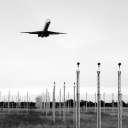I just received a letter, notifying me of an unsettling event in my life. The letter was from an airline, congratulating me on meeting the requirements for their next tier of loyalty membership. In the past year, I’ve apparently flown 28,000 miles on 21 segments, with just this one carrier. My best guess is that my total travel for the year is closer to 40,000 or 50,000 miles. I got on an airplane for the first time at the end of high school, and never imagined this life.
The letter bothered me, and it took some time to understand why. At first glance, the letter feels like a congratulatory note. It is a privilege and a joy to travel so much. Each new ecosystem I’ve seen over the past years has widened my understanding of how the world works, and I wouldn’t easily trade that away. This kind of travel is essential to do good ecology. Charles Darwin spent five years in and around South America; Alexander von Humboldt spent several years exploring Latin America and north; Alfred Russell Wallace lost himself in Amazonia during his youth and later spent a decade wandering through the Malay Archipelago. Deep understandings of ecosystems require firsthand experience – what airplanes give us is simply the opportunity to reach them faster and more comfortably. Think of Wallace, for example – his trans-Atlantic journey home from the Amazon was nearly fatal, when his ship caught fire after twenty-six days at sea, leading to the ship being abandoned and a ten-day journey in open boat before being sighted and rescued. He lost nearly all his specimens, representing four years of exploration. I am glad to have avoided this experience. There are very few parts of the world – even very wild parts – that now are inaccessible with a journey of more than a few days.
It is not the resource usage of this air travel that bothers me. The environmental impact of flying is large, and my carbon footprint is certainly larger than that of almost all people. But nearly all this travel has been for research, and I am a firm believer in the importance of investing in new knowledge. Scientific discoveries, when they are made, last forever, and are open for all to share in (at least eventually, but that is the subject of another piece). New ecological knowledge requires fieldwork and interaction with others, and this requires travel. Imagine telling a young Darwin not to go to the Galapagos, because of the resources wasted in a ship voyage. As a research community we push forward the frontiers of knowledge, and it is very difficult, in advance, to know which one of us, or which piece of work, will be the transformative one. Investment in exploration and collaboration is fundamentally necessary. A recent publication showed that there is embarrassingly little known about some parts of the world, because ecologists don’t go there to study them – urban areas, for one, but also very wild areas.
What bothered me was a different aspect of seeing so many places. Divide 365 days by 21 flights (a lower bound; probably closer to forty) and you’ll see that on average I spend just a few weeks at most in a single place. It is very hard to build a community, a life, or a deep understanding of a place in such a short time. I have felt exhausted by this whirlwind approach to science, and my airline’s letter only confirmed the reality of the situation. To remain in one place is to begin to feel its rhythms and to begin to know it more personally. Aldo Leopold writes about this in his A Sand County Almanac, describing the changes in a landscape over a year, and so does Edward Abbey in Desert Solitaire, sketching a season spent in the desert. Much of the best ecological research comes from long-term, in-depth study of single places, and many of the best ecologists have devoted their careers to knowing single places. Wallace would never have discovered the biogeographic break in Australasia in just a few weeks’ time.
I’ve spent the past four summers in the Colorado Rockies, but I’ve only seen the autumn once and the winter snows never. Summer hailstorms like the one above are rare events, and I’m sure there’s far more I’m missing out on understanding during the rest of the year. I think it’s time to quit airports and stay in one place for a while.




Comments
2 responses to “The itinerant life”
Love the blog, and this was a resonant post for me, someone who values both travel and longs for the sort of consistent community I grew up with. I think I tend to respond by trying to maintain connections through consistent visits — if only for a week or so a year — to the places that are important to me.
(I’m going to be the RMBL winter caretaker this year, which is how I stumbled upon this. Looking forward to 8 months in a single place myself.)
I hope you enjoy the peacefulness of being the RMBL winter caretaker. I’m hoping to get out to the station early next spring so our paths may cross. I’ve enjoyed perusing your photography and writing too – I hope we get to meet!